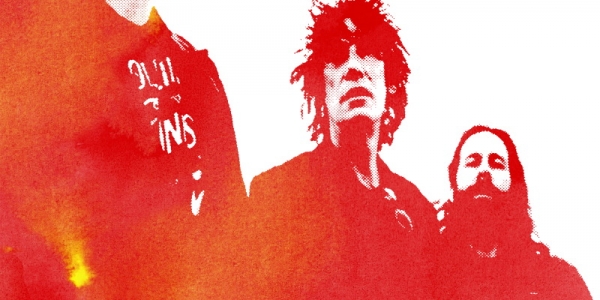It’s put to Brown that moving house might be the worst possible thing to do while hungover, though he remains upbeat about the whole thing. Brown and Hellhounds don’t mind a little dirt under their fingernails. There’s an understanding within Hellhounds that there are rewards for avoiding trends within music and working hard to improve their craft. The results are evident within the trio’s expansive tracks; classically-inspired riffs grow into wide sonic landscapes.
For Brown, it’s important to allow their songs to find their own legs. “With the blues, the space in between [the start and finish of a track] is the magic. A lot of blues guitarists will say less is more,” he tells. Still, Brown understands their songs must have a purpose. “Having said that, I think it’s important to tell a story. Whatever you’re saying, it has to be simple yet powerful. But all that space, that’s great because it really allows you to do lots of different things in your songs.”
Improvisation and experimentation are high on Hellhounds list of priorities. Nothing about the band’s approach is formulaic; instead, they took risks which paid off in spades. The band employed vintage microphones, plate reverbs and rare tape machines for the recording of Hellhounds. Their approach led to a sense of discovery which separates them from many of the paint-by-numbers blues-rock bands currently riding the wave of the garage rock renaissance.
While Brown doesn’t figure Hellhounds should be lumped into this trend, he still understands the possibilities which the inclination entails. “The trend has come about from bands like The Black Keys and The White Stripes. They’ve opened the door for a lot of that kind of music, but realistically we’ve still been doing this for a long time. I don’t think we’re following any trends as such.”
“But in a way I think it’s good,” he continues, “Because it opens a lot of doors for people to understand where this music actually comes from. Our bass player has a huge catalogue of blues music that’s really inspired us as a band. The ‘60’s stuff, we were all brought up with the Yardbirds, Creem and all that and believe it or not, our sound somehow just came about accidentally.”
The songs on Hellhounds may have been the result of a happy accident, but this isn’t going to stop the band from soon giving them wings on stages across Europe. “Our bass player has spent many years touring in Europe with Hugo Race. Hugo produced the album, and it made sense to get this European tour on the horizon,” he says, sounding justifiably proud of the opportunity.
“Obviously we want to tour Australia and get our music out to our local fanbase as much as possible, but when opportunities to tour other places in the world come up, you’ve got to take them.” And America, the birthplace of the blues isn’t far behind. “America’s on the agenda as well,” says Brown. “We’ve got friends in Nashville that are trying to get us over there as well as friends in Texas who are looking to get us at SXSW. As far as what we want to achieve, we just want to expand our horizons and share our music with as many people as possible.”
And they’re on the right track. Though the music of Hellhounds sets up shop in the daring fringes of blues rock, there’s a foundation within the band that ensures this trio are in it for the long haul. “We’ve been playing together for so long now,” says Brown with a genuine enthusiasm. “Even though we’re all involved in different things, we all have the same goal and that’s to make music together and stick together. There have been challenges, but it’s never been all that difficult to stick together and make the music we want to make. We’ve always said Hellhounds will be a band that will never break up. Things may change, but I like to think of it as a long term marriage.”
BY JOSHUA KLOKE

